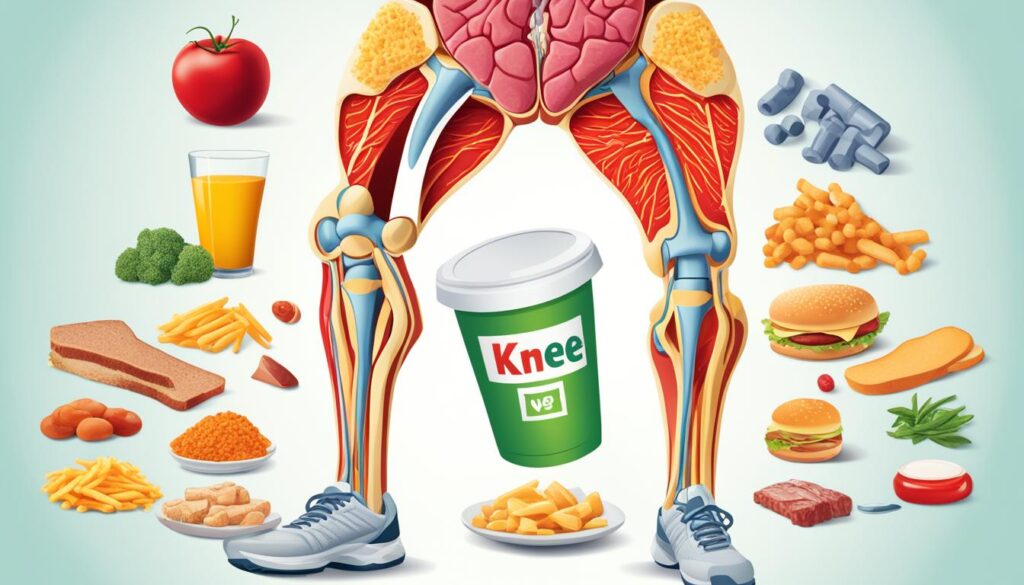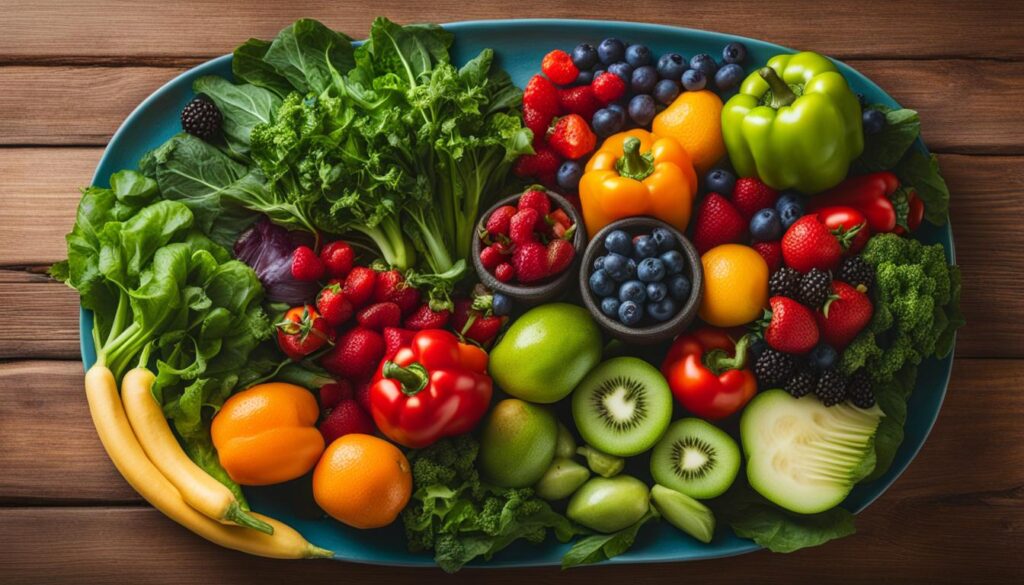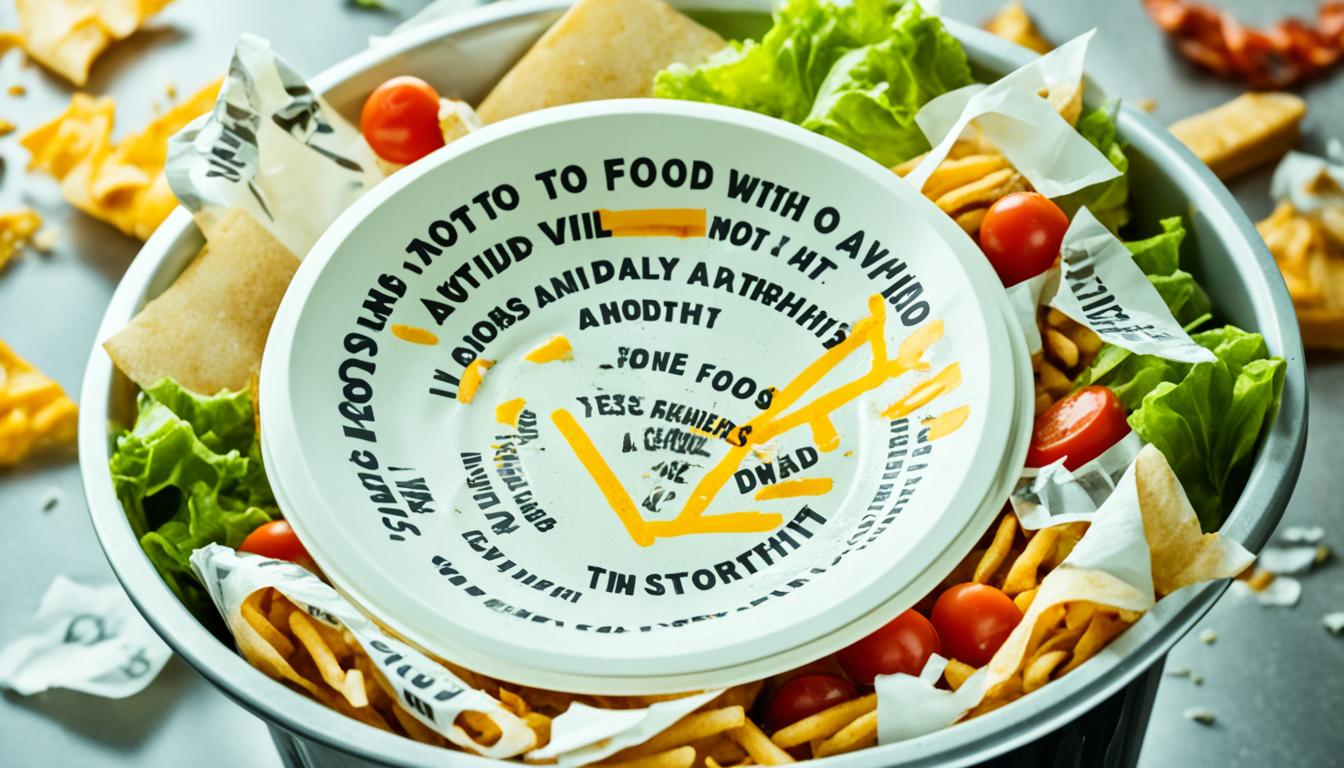Welcome to our comprehensive guide on managing knee osteoarthritis through diet. If you or a loved one are dealing with knee osteoarthritis, you’re likely aware of the impact it can have on daily life. Alongside medication and other treatments, making appropriate dietary choices can play a significant role in managing symptoms and promoting joint health. In this article, we will explore the foods to avoid, as well as provide valuable dietary tips, nutrition guidelines, and an anti-inflammatory diet to help you effectively manage knee osteoarthritis.
As we delve into this essential topic, we will first focus on the foods you should steer clear of to minimize knee osteoarthritis symptoms and prevent further inflammation. Understanding what to avoid is crucial in implementing an effective diet that supports joint health. By eliminating these harmful foods from your meals, you can take a proactive approach towards managing your knee osteoarthritis.
Keep reading to discover the foods that worsen knee osteoarthritis and could potentially aggravate your symptoms. With this knowledge, you’ll be better equipped to make informed dietary choices and ensure that your nutrition positively impacts your joint health.
But it doesn’t end there – we will also provide you with dietary tips specifically tailored for knee osteoarthritis, as well as an anti-inflammatory diet that can help reduce pain and improve joint function. Our aim is to provide you with the nutrition guidelines you need to navigate your knee osteoarthritis journey with confidence.
In the next section, we will explore in detail the specific foods to avoid if you have knee osteoarthritis.
Foods to Avoid with Knee Osteoarthritis
When it comes to managing knee osteoarthritis, it’s crucial to pay attention to the foods we consume. Certain foods can worsen symptoms and contribute to inflammation in the body, making it essential to avoid or limit their consumption. By incorporating dietary changes and avoiding harmful foods, individuals with knee osteoarthritis can effectively manage their condition and improve their quality of life.
- Processed Foods: Processed foods, such as fast food, frozen meals, and packaged snacks, are often high in unhealthy fats, added sugars, and sodium. These can contribute to inflammation and weight gain, both of which can exacerbate knee osteoarthritis symptoms.
- Sugar-Sweetened Beverages: Drinks like soda, fruit juices, and energy drinks are loaded with added sugars, which can promote inflammation and lead to weight gain. Opting for water, unsweetened tea, or flavored water can help reduce sugar intake and support overall joint health.
- Highly Processed Meats: Meats like hot dogs, sausages, and deli meats often contain high levels of unhealthy fats, sodium, and preservatives. These can contribute to inflammation and may worsen knee osteoarthritis symptoms. Choosing lean, unprocessed meats like chicken, turkey, and fish is a healthier alternative.
- Refined Grains: Refined grains, such as white bread, white rice, and pasta made from refined flour, have a high glycemic index and can contribute to inflammation. Opting for whole grains like whole wheat bread, brown rice, and quinoa can provide more nutrients and help manage knee osteoarthritis.
- High-Fat Dairy Products: Full-fat dairy products like whole milk, cheese, and butter contain saturated fats that can promote inflammation. Choosing low-fat or fat-free dairy options and incorporating other sources of calcium and vitamin D can support bone health without exacerbating knee osteoarthritis symptoms.
- Alcohol: Excessive alcohol consumption can lead to weight gain, liver damage, and increased inflammation. It is recommended to limit alcohol intake or avoid it entirely to manage knee osteoarthritis effectively.
“The foods we consume can have a significant impact on our knee osteoarthritis symptoms. By avoiding processed foods, sugar-sweetened beverages, highly processed meats, refined grains, high-fat dairy products, and excessive alcohol, we can reduce inflammation and support the management of knee osteoarthritis.”
It is essential to note that individual responses to certain foods may vary, and it’s important to listen to your body and make adjustments accordingly. Consulting with a healthcare professional or a registered dietitian can provide personalized guidance on managing knee osteoarthritis through diet and help identify specific foods best suited to an individual’s needs.

Foods That Help Manage Knee Osteoarthritis
In addition to avoiding certain foods, incorporating specific foods into your diet can help manage knee osteoarthritis symptoms and reduce inflammation in the body. These foods provide essential nutrients and support overall joint health.
1. Fatty Fish
Including fatty fish like salmon, tuna, and sardines in your diet can be beneficial for knee osteoarthritis. These fish are rich in omega-3 fatty acids, which have been shown to have anti-inflammatory properties and may help reduce joint pain and stiffness.
2. Fruits and Vegetables
Consuming a variety of fruits and vegetables can provide important nutrients and antioxidants that promote joint health. Opt for colorful options like berries, cherries, oranges, leafy greens, and cruciferous vegetables such as broccoli and cauliflower.
3. Whole Grains
Choosing whole grains like brown rice, quinoa, and whole wheat bread instead of refined grains can help reduce inflammation in the body. Whole grains are rich in fiber, vitamins, and minerals that support overall joint health.
4. Nuts and Seeds
Nuts and seeds, such as almonds, walnuts, flaxseeds, and chia seeds, are packed with healthy fats, fiber, and antioxidants. These nutrients can help reduce inflammation and provide essential nourishment for knee osteoarthritis management.
5. Olive Oil
Swap out processed oils for extra virgin olive oil. It contains beneficial compounds, including oleocanthal, that have anti-inflammatory effects. Use it in cooking or as a dressing for salads to reap its benefits.
6. Spices and Herbs
Include anti-inflammatory spices and herbs in your meals, such as turmeric, ginger, garlic, and cinnamon. These ingredients can not only add flavor but also provide potential health benefits for managing knee osteoarthritis.

By incorporating these foods into your diet, you can provide your body with the necessary nutrition to support joint health and manage knee osteoarthritis symptoms. Remember, consult with a healthcare professional or registered dietitian for personalized nutrition guidelines based on your specific needs.
Dairy and Low-fat Dairy Products for Knee Osteoarthritis
There is a misconception that individuals with knee osteoarthritis should avoid dairy products. However, dairy can have beneficial effects on joint health due to its high calcium and vitamin D content. Calcium is essential for strong bones, while vitamin D helps the body absorb calcium and supports overall bone health.
Including low-fat dairy products, such as milk, yogurt, and cheese, in a knee osteoarthritis diet can provide important nutrients. However, it is crucial to choose low-fat options to reduce saturated fat intake, which can contribute to inflammation.
We often hear that dairy is bad for knee osteoarthritis, but that’s not entirely accurate. In fact, low-fat dairy can be an excellent source of essential nutrients for individuals with knee osteoarthritis. It’s all about making smart choices and finding the right balance.
Nutritional Benefits of Dairy for Knee Osteoarthritis
Dairy products, particularly low-fat options, provide several key nutrients that are beneficial for knee osteoarthritis:
- Calcium: Dairy is one of the best sources of calcium, which is essential for maintaining strong bones and joint health. Adequate calcium intake can help prevent bone loss and maintain optimal bone density.
- Vitamin D: Dairy products are fortified with vitamin D, a crucial nutrient that plays a vital role in calcium absorption. Vitamin D deficiency is common among individuals with knee osteoarthritis, and adequate levels can help support bone health and reduce the risk of fractures.
- Protein: Dairy is an excellent source of high-quality protein, which is necessary for tissue repair and maintenance. Including dairy products in the diet can help support muscle strength and overall joint function.
It is important to note that while dairy can provide essential nutrients for knee osteoarthritis, it should be consumed in moderation as part of a balanced diet. It is also essential to listen to your body and consult with a healthcare professional to determine the best dietary approach for your specific needs.
Nightshade Vegetables and Osteoarthritis
There is a belief that nightshade vegetables, such as tomatoes, potatoes, and peppers, can worsen arthritis pain. However, scientific evidence does not support this claim. Nightshade vegetables are nutritious and can be part of a balanced diet for individuals with knee osteoarthritis. It is important to note that everyone’s body is different, and some individuals may have personal sensitivities or allergies to specific foods. If you suspect a negative reaction to nightshade vegetables, it may be worth trying an elimination diet to identify any potential triggers.
While nightshade vegetables contain certain compounds that some believe may contribute to inflammation in arthritis, studies have not found a direct link between nightshade vegetables and joint pain. In fact, nightshade vegetables are rich in vitamins, minerals, and antioxidants, which are beneficial for overall health and may support joint function.
Benefits of Nightshade Vegetables:
1. Vitamin C: Nightshade vegetables, particularly bell peppers, are a good source of vitamin C. This antioxidant vitamin plays a vital role in the synthesis of collagen, a component of healthy joint cartilage.
2. Potassium: Tomatoes and potatoes are rich in potassium, an essential mineral that helps maintain proper nerve function and fluid balance in the body. Adequate potassium intake can minimize muscle cramps and support overall joint health.
3. Lycopene: Tomatoes are an excellent source of lycopene, another powerful antioxidant. Lycopene has shown anti-inflammatory effects and may help reduce the risk of certain chronic diseases.
It’s important to remember that an overall balanced and varied diet is essential for optimal health. Incorporating a wide range of fruits, vegetables, whole grains, lean proteins, and healthy fats into your diet will provide necessary nutrients and support overall joint health.
Other Lifestyle Factors for Managing Knee Osteoarthritis
In addition to making dietary changes, there are other lifestyle factors that can help manage knee osteoarthritis. These factors include:
- Weight Management: Maintaining a healthy weight is crucial for managing knee osteoarthritis. Excess weight puts extra strain on the knee joints, leading to increased pain and reduced mobility. A combination of a balanced diet and regular exercise can help achieve and maintain a healthy weight. If you need assistance with weight management, consult with a registered dietitian or healthcare professional to develop a personalized plan.
- Exercise: Regular physical activity is essential for managing knee osteoarthritis. Exercise helps strengthen the muscles around the knee joint, improves flexibility, and reduces pain and stiffness. Low-impact exercises such as swimming, cycling, and walking are particularly beneficial for individuals with knee osteoarthritis. However, it’s important to consult with an orthopedic specialist or physical therapist to determine the appropriate exercises for your specific condition.
- Joint Protection: Taking measures to protect your knee joints can help alleviate symptoms of knee osteoarthritis. This includes using supportive devices such as braces or orthotics, avoiding activities that put excessive stress on the knees, and maintaining proper posture during daily activities. Additionally, using assistive devices like a cane or walker can help reduce pressure on the knees and improve mobility.
- Pain Management Techniques: Incorporating pain management techniques can help individuals cope with knee osteoarthritis symptoms. This may include applying heat or cold therapy, utilizing assistive devices such as splints or compression sleeves, or engaging in relaxation techniques like deep breathing or meditation. Additionally, over-the-counter pain medications or prescribed medications may be recommended by a healthcare professional to alleviate pain and reduce inflammation.
“Weight management and exercise are crucial for managing knee osteoarthritis and improving overall joint health.”
By adopting and incorporating these lifestyle factors into your daily routine, you can effectively manage knee osteoarthritis and experience improved quality of life.
| Benefits of Weight Management | Types of Exercise for Knee Osteoarthritis |
|---|---|
|
|
By managing your weight and incorporating exercise into your daily routine, you can significantly reduce the impact of knee osteoarthritis and improve your overall joint health.
Importance of Consultation with a Healthcare Professional
When managing knee osteoarthritis through dietary changes, it’s crucial to consult with a healthcare professional who specializes in this area. A registered dietitian or an orthopedic specialist can provide personalized guidance tailored to your specific needs and medical history. They have the knowledge and expertise to help you create a personalized diet plan that supports your overall health and effectively manages knee osteoarthritis symptoms.
During a consultation, a healthcare professional can assess your current dietary habits, identify any potential deficiencies or harmful food choices, and recommend specific dietary modifications. They may also suggest supplements that are backed by current research and evidence. By collaborating with a healthcare professional, you can ensure that your dietary changes are safe, effective, and aligned with the latest scientific insights on knee osteoarthritis management.
Moreover, consulting with a healthcare professional allows for a personalized approach that takes into account your unique circumstances. They can adapt the diet plan to accommodate any underlying health conditions, medications you are taking, and personal preferences or restrictions. This individualized approach optimizes the potential benefits of dietary changes for knee osteoarthritis while minimizing any potential risks.
By working with a healthcare professional, you gain access to their breadth of knowledge and experience in managing knee osteoarthritis. They can provide valuable recommendations on foods to avoid, foods that are beneficial, portion sizes, timing of meals, and strategies to overcome common challenges. With their support, you can feel confident in making informed decisions about your diet and effectively managing knee osteoarthritis symptoms.
Benefits of Consulting a Healthcare Professional for Knee Osteoarthritis:
- Personalized guidance based on individual needs and medical history
- Recommendations for specific dietary modifications backed by research and evidence
- Identification of potential deficiencies and harmful food choices
- Adaptation of the diet plan to accommodate underlying health conditions and personal preferences
- Access to expert knowledge and experience in managing knee osteoarthritis
Consulting a healthcare professional is an essential step towards achieving optimal outcomes in managing knee osteoarthritis. Their expertise ensures that your dietary changes are personalized, safe, and effective in reducing pain, inflammation, and improving joint function. Empower yourself by seeking professional guidance on creating a personalized diet plan that supports your knee osteoarthritis management journey.
| Benefits of Consulting a Healthcare Professional for Knee Osteoarthritis |
|---|
| Personalized guidance based on individual needs and medical history |
| Recommendations for specific dietary modifications backed by research and evidence |
| Identification of potential deficiencies and harmful food choices |
| Adaptation of the diet plan to accommodate underlying health conditions and personal preferences |
| Access to expert knowledge and experience in managing knee osteoarthritis |
Consulting with a healthcare professional ensures that dietary changes are safe and effective for managing knee osteoarthritis symptoms
Conclusion
Managing knee osteoarthritis through diet is crucial for effective symptom management. By avoiding foods that worsen inflammation and incorporating foods with anti-inflammatory properties, we can reduce pain and improve joint function. It is essential to prioritize a balanced diet that includes plenty of fruits, vegetables, lean proteins, and healthy fats.
In addition to dietary changes, other lifestyle factors play a significant role in knee osteoarthritis management. Maintaining a healthy weight and engaging in regular exercise can further support joint health and reduce symptoms. However, it is essential to consult with a healthcare professional before making significant dietary changes or starting any new exercise program.
Healthcare professionals, such as registered dietitians or orthopedic specialists, can provide personalized guidance based on individual needs and medical history. They can recommend specific dietary modifications or supplements based on current research and evidence. Consulting with a healthcare professional ensures that our dietary changes are safe and effective for managing knee osteoarthritis symptoms.
In conclusion, a well-rounded approach to knee osteoarthritis management includes dietary modifications, lifestyle adjustments, and professional guidance. By prioritizing a healthy diet, maintaining a healthy weight, exercising regularly, and consulting with a healthcare professional, we can effectively manage knee osteoarthritis and improve our overall quality of life.
FAQ
What are some foods to avoid with knee osteoarthritis?
Certain foods can worsen knee osteoarthritis symptoms and contribute to inflammation in the body. It’s best to avoid or limit foods such as processed snacks, sugary drinks, red meat, fried foods, and foods high in saturated fats.
What foods can help manage knee osteoarthritis?
Including certain foods in your diet can help manage knee osteoarthritis symptoms and reduce inflammation. Foods that may benefit individuals with knee osteoarthritis include fatty fish, berries, leafy greens, nuts, seeds, and whole grains.
Should dairy products be avoided in a knee osteoarthritis diet?
No, dairy can have beneficial effects on joint health due to its high calcium and vitamin D content. Low-fat dairy products, such as milk, yogurt, and cheese, can be included in a knee osteoarthritis diet.
Do nightshade vegetables worsen knee osteoarthritis symptoms?
Scientific evidence does not support the claim that nightshade vegetables worsen knee osteoarthritis pain. Nightshade vegetables, such as tomatoes, potatoes, and peppers, are nutritious and can be part of a balanced diet for individuals with knee osteoarthritis.
What other lifestyle factors can help manage knee osteoarthritis?
In addition to dietary changes, maintaining a healthy weight and engaging in regular exercise can help manage knee osteoarthritis. Physical therapy, using assistive devices, and joint-friendly activities like swimming or cycling can also be beneficial.
How important is consultation with a healthcare professional for knee osteoarthritis?
It is crucial to consult with a healthcare professional, such as a registered dietitian or an orthopedic specialist, when making dietary changes for knee osteoarthritis. They can provide personalized guidance based on individual needs and medical history.

Leave a Reply